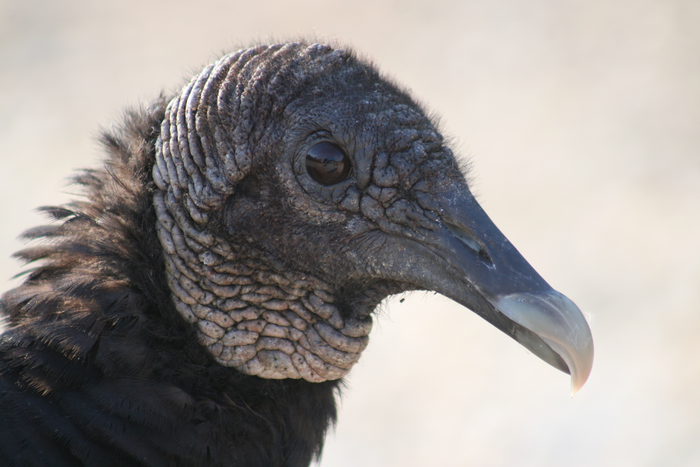Since the 1950s, humanity has produced an estimated 8.3bn tons of plastic, adding a further 380m tons to this amount each year. Only 9% of this gets recycled. The inevitable result is that plastic is everywhere, from the depths of the oceans to the summit of Everest – and notoriously, inside the tissues of humans and other organisms.

Credit: Hannah Partridge
Since the 1950s, humanity has produced an estimated 8.3bn tons of plastic, adding a further 380m tons to this amount each year. Only 9% of this gets recycled. The inevitable result is that plastic is everywhere, from the depths of the oceans to the summit of Everest – and notoriously, inside the tissues of humans and other organisms.
The long-term effects of ingested plastic on people aren’t yet known. But in rodents, ingested microplastics can impair the function of the liver, intestines, and exocrine and reproductive organs.
Especially at risk of ingesting plastic are scavenging birds. For example, New World vultures regularly forage at landfills, and have been observed to leisurely pick at synthetic materials such as boat seats, rubber seals, or roofs.
Now, researchers from the US have shown that the amount of plastic ingested by black and turkey vultures (Coragyps atratus and Cathartes aura) can be predicted from their location on suburban and exurban maps. This isn’t just a distinction between country versus city birds: the amount ingested depends on the local density of human commerce within urbanized landscapes. These findings are published in Frontiers in Ecology and Evolution.
“Here we show that black vultures and turkey vultures in areas with more urban development and a greater density of commercial food providers ingest more plastic,” said Hannah Partridge, a doctoral student at the Department of Geography and Earth Sciences of the University of North Carolina at Charlotte, and the study’s first author.
“It’s possible that they eat some of this plastic on purpose rather than exclusively by accident, as is typically believed.”
Vulture pellets record plastic consumption
In 2021 and 2022, Partridge et al. studied eight communal roosts shared by black and turkey vultures across the Charlotte Metropolitan Area (human population 2.8m and growing). Roosts typically host between 20 and 500 vultures. Beneath the roosts, they collected a total of 1,087 pellets of undigested material vomited up by the vultures.
Of these pellets, 60% were found to contain plastic, making up 2.7% of the total mass on average. Other components included vegetation, dirt, rocks, animal remains, metal, fabric, paper, wood, and glass. The authors could identify the types of plastic material with Fourier transform infrared (FTIR) spectroscopy: most commonly found were silicone rubber (7.5% of samples analyzed), high density polyethylene (7.0%), polyethylene (6.4%), and silicate bio polyethylene (5.3%).
The researchers then searched for associations between the amount of plastic within pellets and four measures of human development within increasing distance – from 400 meters to 20km as the vulture flies – from the roost. These were the density of commercial food providers (from mom-and-pop stores and food trucks to supermarkets and restaurants), the density of livestock and game producers, the amount of developed landcover, and the distance to the nearest landfill.
Food stores and restaurants
Exploratory statistical analyses showed that the proportion of pellet mass composed of plastic strongly increased with increasing urban landcover and increasing density of food providers within 20km. From these results and direct observations, the authors concluded that especially black vultures in the Charlotte Metropolitan Area may be primarily ingesting plastics directly at dumpsters belonging to food providers.
“Black vultures will often roost overnight on a transmission tower next to a fast food restaurant and fly straight to the dumpster first thing in the morning,” observed Partridge. “Turkey vultures do this less often: they prefer more rural areas and natural food sources.”
Curious birds
But do the vultures eat all this plastic on purpose or by accident? The researchers hypothesized that vultures may commonly mistake plastic for nutritious bone fragments, which they would normally get from carrion.
“Vultures are curious and always looking for new food sources, so they may ingest plastic thinking it’s food,” said Partridge. “But they may also sometimes ingest plastic intentionally, to collect bulk to help vomit up indigestible parts of carrion like hair.”
So what can we do to prevent plastic from being eaten by vultures and other vulnerable animals?
“Food providers such as restaurants and grocery stores can ensure that their garbage is properly bagged, that trash makes it to the dumpster, and that the dumpster is closed and secured. We can also work towards banning single-use plastics to protect vultures and other species from harm,” advised senior author Dr Sara Gagné, an associate professor in the same department.
Journal
Frontiers in Ecology and Evolution
DOI
10.3389/fevo.2023.1158453
Method of Research
Observational study
Subject of Research
Animals
Article Title
Vultures in the southeastern United States ingest more plastic in landscapes with more developed landcover
Article Publication Date
12-Apr-2023
COI Statement
The authors declare that the research was conducted in the absence of any commercial or financial relationships that could be construed as a potential conflict of interest




